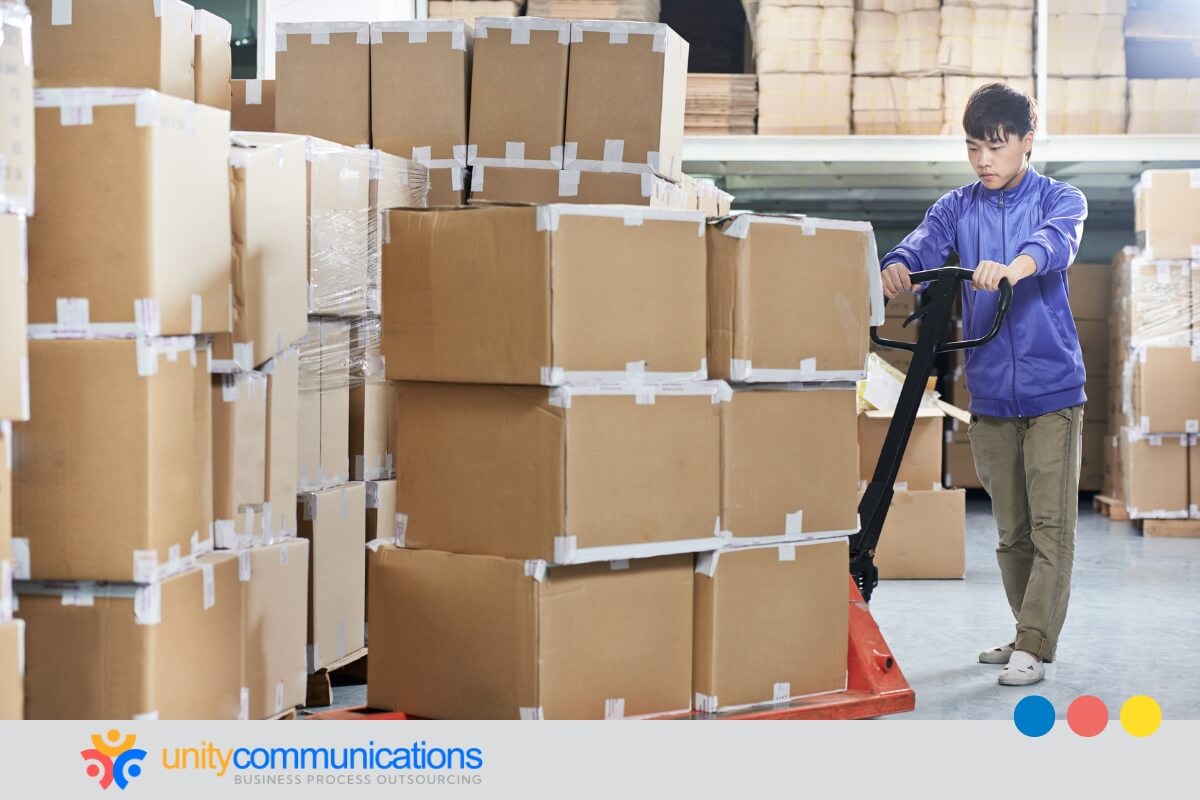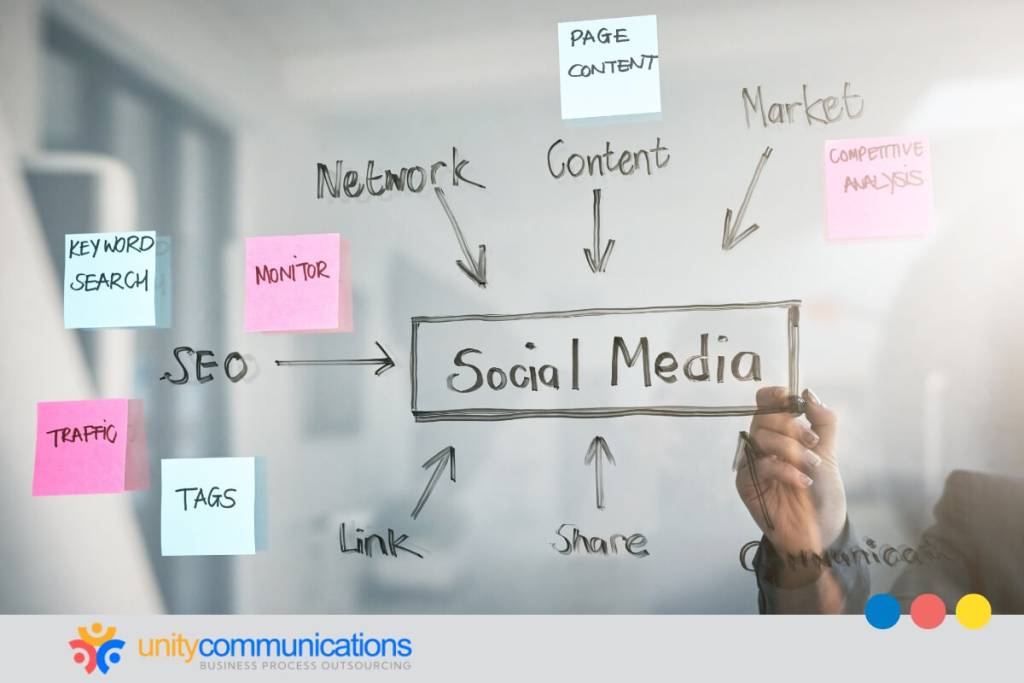Table of Contents
Managing the supply chain can be overwhelming as your business scales. Business process outsourcing (BPO) can help streamline operations and cut costs.
This article explores everything you need to know about logistics BPO. It answers the question “What is logistics outsourcing?” and covers its scope, benefits, and challenges. It also provides tips on finding the best provider and maintaining oversight throughout the partnership.
Continue reading to learn more!
What is logistics outsourcing?

According to Dimension Market Research, the global logistics outsourcing market could hit $1.6 trillion by 2033 at a compound annual growth rate (CAGR) of 4.7%. This reflects the rising demand for third-party logistics (3PL) partners to manage complex supply chains.
But what is logistics outsourcing? Why is it better than in-house supply chain management? To answer this question, let’s define BPO.
BPO is delegating repetitive tasks to external providers to reduce costs, enhance productivity, and scale operations quickly. This approach also allows in-house teams to focus on other high-impact activities, such as strategic planning.
Handing off the standard functions of BPO to experts helps your organization stay competitive. However, as your business expands or processes become complex, you need 3PL partners who can:
- Handle intricate supply chain demands.
- Leverage advanced technology.
- Adapt quickly to market shifts to sustain growth and protect your margins.
Unlike general BPO firms, 3PL companies offer specialized infrastructure and assets. Examples include warehouses, trucks, distribution centers, and last-mile delivery networks. They also provide the following services:
- Transportation management (inbound and outbound)
- Warehousing and inventory management
- Order fulfillment and distribution
- Freight forwarding and customs clearance
- Supply chain planning and optimization
- Reverse logistics and returns handling
- Technology integration and data analytics for logistics
With these capabilities, logistics outsourcing goes far beyond traditional BPO. The following section enumerates the advantages of this business model.
Key benefits of logistics outsourcing
Logistics outsourcing offers strategic advantages that drive growth and efficiency. These include:
- Cost savings. Partnering with providers can reduce labor and infrastructure expenses.
- Scalability. Your internal team can quickly adjust logistics capacity based on seasonal demand or business growth without significant investments.
- Access to specialized expertise. You gain industry knowledge, advanced technology, and efficient processes from logistics professionals.
- Improved focus on core activities. 3PL companies can free up internal resources for other strategic activities, such as product development, sales, and customer service.
- Faster delivery times. A 3PL provider optimizes networks and systems for quicker, more reliable shipping and fulfillment.
These benefits show how logistics outsourcing keeps your business efficient and agile.
Common outsourced logistics functions
Relying on third-party experts unlocks greater efficiency, which is precisely what logistics outsourcing is all about. Some functions you can delegate are:
- Transportation management: Handling inbound and outbound shipping, including carrier selection and route optimization
- Warehousing: Managing storage, inventory control, and order fulfillment
- Freight forwarding: Coordinating international shipments, documentation, and customs clearance
- Order fulfillment: Picking, packing, and shipping products to customers
- Inventory management: Monitoring stock levels, reordering, and forecasting demand
- Reverse logistics: Processing returns, exchanges, and recycling
- Last-mile delivery: Managing the final leg of customer delivery, which is often complex and costly
Outsourcing these roles to 3PL teams helps improve service quality and foster growth and innovation. You can streamline operations and reduce errors and delays.
Challenges and risks associated with outsourcing logistics
According to IBM, about 20% of data breaches were linked to third parties. The impacts of cyberattacks are massive, from significant financial losses to reputational damage.
Understanding what logistics outsourcing is involves knowing its advantages. But it’s equally important to recognize the potential risks and mitigate them. These include the following:
- Loss of control. Relying on an external provider can limit visibility and direct oversight of logistics operations.
- Communication barriers. Miscommunication between your team and the provider can lead to errors or delays.
- Service inconsistencies. Performance might vary depending on the provider’s processes, staff, or regional capabilities.
- Hidden costs. Unexpected fees or poorly defined contract terms can lead to higher expenses than anticipated.
- Dependency on one provider. Over-reliance on a single partner might reduce flexibility and increase vulnerability if issues arise.
Identifying these risks early lets you set up safeguards to keep the supply chain resilient despite disruptions.
8 steps to successfully implement logistics outsourcing
Truly understanding what logistics outsourcing is—and making the partnership successful—requires careful planning, clear communication, and continuous management. Here are the essential steps:
- Assess your logistics needs. Identify which logistics functions to outsource and what goals you want to achieve (e.g., cost reduction, faster delivery).
- Evaluate potential providers. Research and compare providers based on their experience, services, technology, and reputation.
- Request proposals and conduct interviews. Gather detailed proposals and meet with providers to discuss their approach and alignment with your business.
- Negotiate contracts and service agreements (SLAs). Define scope, pricing, responsibilities, and performance metrics to set expectations correctly.
- Plan for transition. Develop a detailed handover plan with clear timelines, assigned responsibilities, and communication strategies. This helps prevent confusion and minimizes disruptions.
- Integrate systems and processes. Ensure your internal systems connect smoothly with the provider’s technology for real-time tracking and data sharing.
- Train your team. Educate internal staff on the new workflows and points of contact.
- Monitor and optimize. Regularly review performance, address issues, and adjust the partnership for continuous improvement.
Following these steps helps build an outsourcing relationship that delivers long-term value.
Criteria for selecting the right logistics partner

Selecting the right logistics partner ensures a smooth, efficient, and scalable supply chain. The ideal provider should align with your business goals, offer reliable service, and be able to grow with your needs.
Some essential factors to consider are the following:
- Experience and industry expertise. Choose a provider with a strong track record and relevant knowledge in your specific market.
- Range of services. Determine whether they offer the logistics functions you need today and whether they are scalable.
- Technology capabilities. Look for advanced tracking, reporting, and integration options to enhance visibility and control.
- Scalability and flexibility. The partner should be able to adapt to changes in volume, demand, or service scope.
- Improved customer service and communication. Responsive support and clear communication are essential for problem-solving and smooth operations.
- Compliance and security standards. Confirm the provider meets industry regulations and follows best practices in data and cargo security.
- Cost structure and transparency. Evaluate pricing models and confirm all costs are clear and upfront.
Choosing a 3PL with transparency, expertise, and scalability creates a partnership that drives growth and safeguards operations.
Strategies to maintain control and visibility over outsourced operations
Maintaining control over 3PL partnerships is essential to keep your supply chain running smoothly. The right strategies help you stay informed and responsive, even when third parties manage critical functions.
- Establish key performance indicators (KPIs). Define your metrics and service levels to track provider effectiveness.
- Leverage technology integration. Use compatible systems for real-time data sharing and centralized monitoring.
- Regular communication and reporting. Schedule consistent meetings and require detailed reports to stay updated on logistics operations.
- Conduct periodic audits and reviews. Perform evaluations to determine compliance and areas for improvement.
- Build strong collaborative relationships. Foster trust and transparency with your provider for better problem-solving and alignment.
These strategies help you maintain robust control and fulfill what logistics outsourcing is about: supporting your business goals.
Technology trends in outsourced logistics

Technology is transforming the capabilities of logistics outsourcing. From advanced tracking systems to AI-driven forecasting, these trends reshape how businesses optimize their BPO supply chains.
- By 2035, artificial intelligence could boost productivity in the logistics sector by over 40%. It can automate many supply chain tasks, enhancing efficiency and precision.
- AI-powered warehousing inventory management can predict stock needs, optimize storage layouts, and trigger reorders. These reduce carrying costs and the risk of stockouts.
- Advanced software tools enable real-time tracking, more intelligent inventory control, and seamless communication.
These technologies will help you become more agile and competitive. They will refine your logistics outsourcing activities while you retain control of your supply chain.
The bottom line
Logistics outsourcing helps reduce costs, improve efficiency, and strengthen focus on core competencies. It also allows you to adapt quickly to market changes and improve competitiveness. This makes the partnership key to staying responsive and future-ready.
Are you ready to optimize supply-chain management through third-party logistics? Let’s connect and discuss how our services can streamline your operations.




